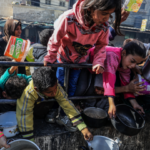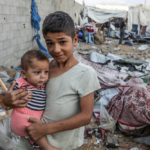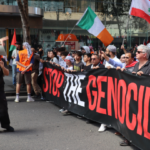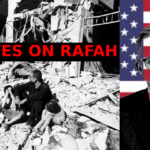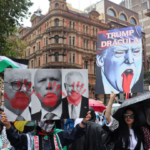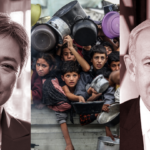Calls for Nations to Physically Intervene in the Gaza Genocide Are Rising
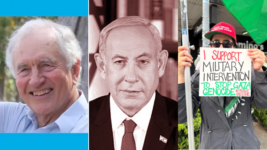
A shift appeared to come to fruition last week, as photos on social media sites of pro-Palestinian activists holding signs calling for intervention in response to the Gaza genocide became ubiquitous, with the general gist being that the activists support intervention in the Palestinian Occupied Territory, with some specifying it’s an interruption of the military kind that’s necessitated.
Soon after these images began appearing, commentaries in the form of articles or group emails raising the option of physically intervening suddenly started being published, explaining why it’s come to the point that an approach other than appealing to the better nature of the Israeli state is now warranted.
A key point has been the Netanyahu’s government’s early May announcement that it would be escalating its 18-month-long military operation in the Gaza Strip in order to take control of the entire region, with its military forces subsequently being deployed there permanently, with the Palestinians, whose land it is, being removed evidently for their own protection.
This scenario mirrored that set out by US president Donald Trump in February, when he proclaimed his nation would be taking Gaza and developing it into a resort town, once the Palestinians had been ethnically cleansed, which was such an affront to the basic concepts underpinning international law that it cleared the way for the Israeli PM to openly assert Israel would now be doing the same.
But after more than a year and a half of bearing witness to Tel Aviv destroying any semblance of a shared global humanity to the point that 14,000 babies are on the brink of starvation, while 930,000 kids are about to descend into famine, the idea that there are further unattempted options open to the international community to stop the genocide seems implausible, even though they do exist.
Responsibility to protect
Almost as if he’d been out there coordinating with the pro-Palestinian activists, soon after their images calling for intervention began appearing online, an article was posted on military intervention, which was written by Professor Stuart Rees, who, as he’s the founder of the Sydney Peace Foundation, wasn’t necessarily the first academic one might have guessed would write it.
Entitled Millions Want Intervention to Stop Israeli Slaughter of Palestinians, the article raises the 2005 UN General Assembly established Responsibility to Protect (R2P) principle, which is a doctrine that asserts that states have a responsibility to protect their own populations from international criminal offences, like genocide, war crimes and crimes against humanity.
And under R2P, if a nation is failing its obligation to protect its own populace in this regard, then the broader global community has a responsibility to step in and save innocent people under attack.
“If a government feels squeamish about intervention against Israeli slaughter, it could be reassured by the judgment of former UN secretary-general Kofi Annan,” writes Rees.
“When explaining moral arguments for military intervention, he said that if such initiatives pursue the positive humanitarian goals of the UN Charter, they are more justifiable than inactivity in the face of gross injustice.”
Rees also reminds that under article 1 of the 1948 Convention on the Prevention and Punishment of the Crime of Genocide, Australia, as do all other state parties to the international agreement, have an obligation to stop the mass killing of a group if one is occurring.
As for how this might look in the local context, Rees outlines that Australians for Humanity has called for a multinational naval force to escort aid boats to Gaza, and the deployment of a UN international peacekeeping force to be deployed to ensure that the aid is properly distributed and to prevent Israel from annexing the Palestinian Occupied Territory: Gaza and the West Bank.
The professor further pointed out that while France, the UK and Canada finally issued a bold statement of opposition against Israel last week, calling on it to stop its unacceptable breaches of humanitarian law or else it will be subjected to “targeted sanctions”, Australia instead joined a coalition issuing a much weaker statement, regarding the ending of the aid blockade into the region.
Uniting for peace
Another unexpected party to be on the frontline of calls for intervention in Gaza is World Beyond War, although this global coalition is more focused on physical intervention into the crisis rather than intervention of the military kind, and as the group underscores, when the crime of genocide is underway, “the law is meant to be used to prevent it, not just review it after the fact”.
World Beyond War is raising another UN mechanism, the UN General Assembly’s resolution 377, otherwise known as Uniting for Peace.
Adopted in November 1950, resolution 377 permits the UN General Assembly to step in and intervene in place of the UN Security Council in a situation where global security is under threat because the Security Council is unable to act.
The Security Council is the United Nations organ charged with maintaining international security and peace. The body has 15 members, five of whom are permanent – China, France, Russia, the UK and the US – while the remaining ten are made up of rotating appointees from other state parties.
The problem with the Security Council is that one of its five permanent members can veto any resolution being made. And from the time that the Gaza genocide broke out in October 2023 up until November 2024, the United States voted down four Security Council resolutions that were attempting to establish a ceasefire to bring about an end to Israel’s wholesale slaughter.
“The General Assembly should not escalate the war or deploy armed troops,” World Beyond War made certain. “It should convene an emergency session and use ‘Uniting for Peace’ to impose an arms embargo and targeted sanctions on the Israeli government, suspend the Israeli government from the United Nations, and send to Palestine unarmed peacekeepers.”
World Beyond War stresses that intervention in Gaza must be nonmilitary as past experiences have shown that unarmed peacekeepers are much more effective. The peace group outlines that unarmed civilian groups already operating in places like the West Bank are most effective because they don’t seek to engage with the aggressors but instead serve to hold them to account.
Weak and ineffective
The official death toll of the Gaza genocide is currently close to 54,000 Palestinians murdered, while Al Jazeera now reports that the population of The Strip is 2.1 million Gazans, whereas in October 2023, there were 2.3 million and this drop is due to the local population having declined by about 160,000.
The International Court of Justice ruled on 26 January 2024 that the claim that Israel is perpetrating a genocide in the Gaza Strip is plausible and it ordered Tel Aviv to stop its genocidal attacks back at the time it gave its interim ruling, while in July last year, the World Court further found that Israel is illegally occupying the Palestinian Occupied Territory and that it must withdraw immediately.
As the most heinous atrocity of recent times continues through its 19th month despite all the international outcry, reports written, resolutions passed and demands for it to end, Israel continues on seemingly beyond reproach, although the globe’s greatest power, the US, backs Tel Aviv to the hilt, and Washington has been funding the mass killing since it began.
And now, after 19 months of providing cover for Israel, claiming mass slaughter is merely an act of self-defence and watching on as countless innocent children have been killed, while the edifice of international law is too being torn down, our recently returned prime minister Anthony Albanese on Monday condemned Israel’s denial of aid into Gaza, just like the late one to the ball.


